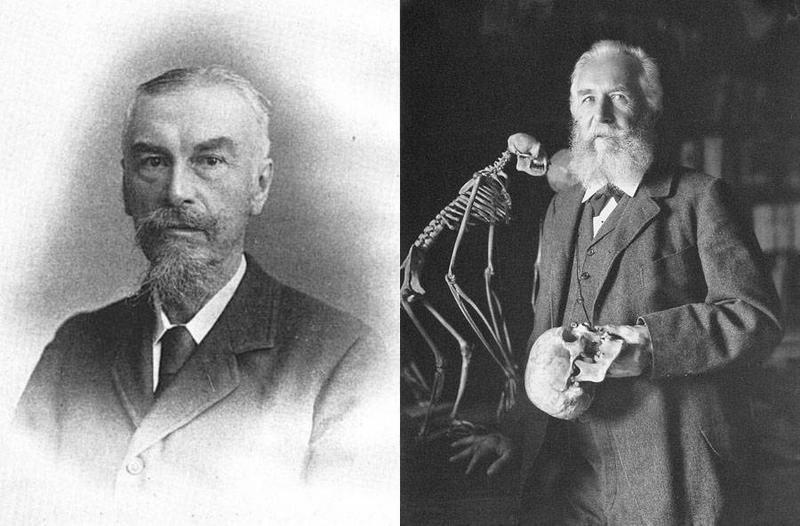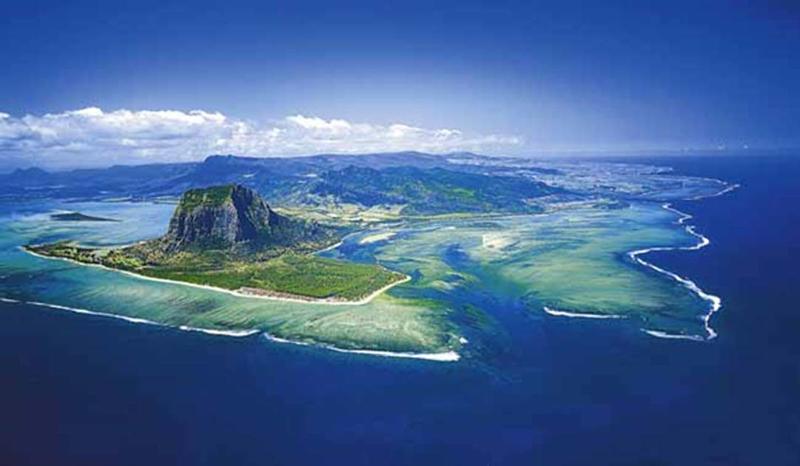Explore the Mythical Lost Continent of Lemuria
By Sarah Norman | April 21, 2024
Lemuria: The Pioneering Bridge to Humankind's Origins?
Dive into the enthralling tapestry of history where myths intertwine with science, and legends breathe life into geological findings. Have you ever pondered about lost civilizations, sunken continents, or ancient tales that might bear a kernel of truth? Journey with us as we unravel the captivating enigma of Lemuria, a once-dismissed theory that has found startling resonance in modern-day discoveries. From the musings of 19th-century thinkers to the breakthroughs of 21st-century scientists, prepare to embark on an expedition across time and truth. Let's uncover the secrets lying deep beneath the waves and the pages of history. Welcome to the odyssey of Lemuria.

As the whispers of Lemuria spread, eminent figures of science and literature were captivated by its allure. Among them was the illustrious German biologist, Ernst Haeckel, who, in the late 1860s, wove his own rendition of Lemuria. To Haeckel, Lemuria was more than just a lost land; it was a pivotal junction in human evolution. He speculated that this mysterious land bridged the vast expanse between Asia, considered by some as the original birthplace of humanity, and Africa. Lemuria, in Haeckel's vision, wasn't merely a conduit but perhaps "Paradise" itself, the very heart from which the pulse of humankind originated. In 1870, he wrote:
The probable primeval home or ‘Paradise’ is here assumed to be Lemuria, a tropical continent at present lying below the level of the Indian Ocean, the former existence of which in the tertiary period seems very probable from numerous facts in animal and vegetable geography.
Lemuria's Scholarly Start

While tales of lost continents and civilizations have pervaded our collective imagination for ages, the theory of Lemuria found its scientific foothold in the writings of British zoologist, Philip Sclater. His 1864 paper, “The Mammals of Madagascar”, was less about mysterious civilizations and more a quest for answers. Faced with a perplexing puzzle: why were certain primate fossils exclusive to Madagascar and India and conspicuously absent in regions like Africa and the Middle East?
Sclater Believed That Lemuria Was A Land Bridge

Sclater proposed a daring answer. He envisaged Lemuria as not just a myth but as a genuine land bridge, now submerged, that once connected these distant lands. It was a bold attempt to explain the enigma of biogeography, a theory that captured imaginations and gave a more tangible form to the legendary lost continent.
Sclater's Glimpse into Earth's Hidden Past

Philip Sclater's land of Lemuria, named intriguingly after the elusive lemurs, was not just the stuff of adventure tales but a product of profound scientific insight. In the 1870s, when the concepts of continental drift and plate tectonics were still beyond the horizon, Sclater's words hinted at a world long-lost: a "Paradise" submerged beneath the waves, a testament to a bygone era.
Sclater's Lemuria Theory Was Actually Helpful For Modern Geology

While many of his contemporaries might have seen such assertions as flights of fancy, Sclater was laying the groundwork for modern geology. His bold assertion that a continent, now hidden beneath the Indian Ocean, once flourished during the tertiary period was nothing short of revolutionary. Through the lens of history, we see Sclater not just as a dreamer, but as a visionary who dared to peer into Earth's ancient secrets.
Lemuria Reimagined

In the tapestry of Victorian mysticism, Helena Blavatsky, a beacon of the Theosophy movement, took Sclater's theory and spun it into a rich, ethereal narrative. To Blavatsky, Lemuria was no mere land bridge but the sacred cradle of humanity, the very birthplace of our species. In her teachings, the denizens of this lost paradise weren't just ancestors but ethereal Lemurians – beings of pure enlightenment, embodying a harmony we can only dream of.
Blavatsky Believed That Lemuria Was Filled With Giant Four-Armed Humanoids

In her seminal work, The Secret Doctrine, penned in 1888, Blavatsky detailed these majestic Lemurians as towering 15-foot-tall entities, a blend of genders, boasting four arms, and sharing their Eden with the titanic creatures we now call dinosaurs. More than just a lost race, for Blavatsky and her followers, the Lemurians were the embodiment of humanity's forgotten spiritual pinnacle.
When Lemuria Graced National Emblems

The enigma of Lemuria didn't just captivate scholars and poets; its allure permeated even the symbols of nationhood. As the 20th century dawned, and geologists grappled with theories to demystify the continents' puzzling placements, Lemuria's legend grew more vibrant. Its significance reached such prominence that it was immortalized in the British Indian Ocean Territory's coat of arms. This heraldic emblem depicted 12 proud men, believed to be the guardians or denizens of Lemuria, standing resolute against the tides of time. Above them, a Latin inscription boldly proclaimed, "Limuria is in our trust/charge." A testament not just to a potentially lost land but to the era's quest for understanding, identity, and a bridge to a past that might have shaped continents and cultures alike.
The Living Legacy of Lemuria: Myth, Mountain, and Mystic Quartz

The tale of Lemuria doesn't conclude with its alleged submersion. For many believers, the legacy of this enigmatic land and its enlightened inhabitants lingers on. Some postulate that, like the fabled Atlantis, Lemuria's denizens simply evolved to embrace an underwater existence, their cities shimmering below the waves. Yet, a more terrestrial claim emerges from the shadows of Mount Shasta in California, where whispers suggest that Lemurians now reside, safeguarding ancient wisdom within the mountain's cavernous depths.
Lemurian Seed Quartz Can Impart Mystic Knowledge

Perhaps the most intriguing belief is tied to the Lemurian Seed Quartz, a unique crystal hailing from Brazil. Allegedly imprinted with the Lemurians' vast knowledge, this quartz is said to be a beacon for those seeking the lost continent's profound mysteries. Whether submerged city, mountainous refuge, or crystalline legacy, the story of Lemuria continues to beckon and bewitch.
Kumari Kandam & Lemuria: A Confluence of Cultures and Legends

The enthralling legend of Lemuria didn't merely resonate within Western science; it found a chord with age-old tales from the East. Notably, Tamil writer Devaneya Pavanar drew parallels between Lemuria and the fabled sunken land of Kumari Kandam, revered in ancient Tamil literature. This submerged realm, said to host 49 prosperous Tamil settlements, was believed to be the very nexus of ancient civilization.
Lemuria Remains A Legacy For The Tamil People

For the Tamil people, Lemuria wasn't just a bridge between continents, but a potential bridge to their storied past—a validation of Kumari Kandam. It provided a historical context to their distinct identity and aspirations of sovereignty, carving out a legacy separate from neighboring India's vast tapestry and reinforcing their unique place within the annals of Sri Lankan history.
From Myth to Reality: Mauritia's Grand Unveiling

In the 19th century, Philip Sclater proposed a bold theory about a lost land connecting Madagascar and India, a concept many dismissed as mere speculation. However, come the 21st century, with advanced technology and detailed geological studies, scientists confirmed the existence of a sunken microcontinent named Mauritia in 2017. This ancient landmass had indeed once joined Madagascar and India, affirming Sclater's ideas, before it disappeared beneath the ocean's surface around 70 million years ago. The revelation of Mauritia highlights the visionary insights of past scholars and serves as a testament that the boundaries separating myths from truths can sometimes be more permeable than we imagine.
The Lemuria Theory Picked Up Steam With Scientists

Once the idea of Lemuria gained some approval from scientists, other scholars started talking about it too. Ernst Haeckel, who studied how living things are related and evolved (like Darwin did), suggested Lemuria to explain why we don't see certain early human-like creatures in the fossil record. Another person said that Haeckel came up with this idea before Sclater, but he didn't call it "Lemuria."
The Concept Of Plate Tectonics Ended The Lemuria Discussion For Good

The idea of Lemuria was completely bodied by mainstream scientists once the theories of plate tectonics and continental drift became widely accepted. According to the theory of plate tectonics, Madagascar and India were once connected as part of a big piece of land. But over millions of years, this land broke apart because of the movement of huge plates in the Earth's crust. The main chunk of land didn't mostly sink under the sea, it just split into pieces.
True Believers Still Visit Mount Shasta Every Year

Every year, Lemuria-Truthers travel to Mount Shasta on a special trip. One group called the Saint Germain Foundation organizes a yearly event called the "I AM COME!" Pageant, which is about the life of Jesus the Christ in Mt. Shasta. Another group known as the Rainbow Family holds a gathering every August to remember this trip. These religions are a mix of different spiritual practices that come from native, Christian, Buddhist, and Taoist traditions. They combine these beliefs and leave out parts they consider "negative."
The True Journey of the Lemurs

While the poetic allure of a Lemurian race evolving into lemurs tugged at the heartstrings of many, recent discoveries have woven a different narrative. The unveiling of Mauritia might resonate with Sclater's musings, but the timeline of life itself sketches a different journey for our furry friends. Mauritia vanished into oceanic depths approximately 84 million years ago, a timeline quite detached from the lemurs' evolution. These curious creatures took their first evolutionary steps on Madagascar around 54 million years ago, making a daring swim from the nearby African mainland. As the tides of time flowed, and continents drifted, the lemurs charted their own course, leaving behind a story both grounded in fact and bathed in the magic of mystery.
C. S. Lewis's Toast to Lost World

C. S. Lewis, renowned for weaving realms of fantasy in the "Chronicles of Narnia", didn't limit his imaginative prowess solely to prose. In his evocative poem "The Last of the Wine", Lewis elegantly conjures visions of lost continents and ancient civilizations;
A man to have come from Atlantis eastward sailing —
Lemuria has fallen in the fury of a tidal wave;
The cities are fallen; the pitiless, all prevailing.
Merging fact and fantasy, he weaves together both Lemuria and Atlantis—two of history's most enigmatic lost lands. While Atlantis has long dominated lore as the sunken jewel of antiquity, Lemuria's mention alongside it is a testament to its growing mystique.

